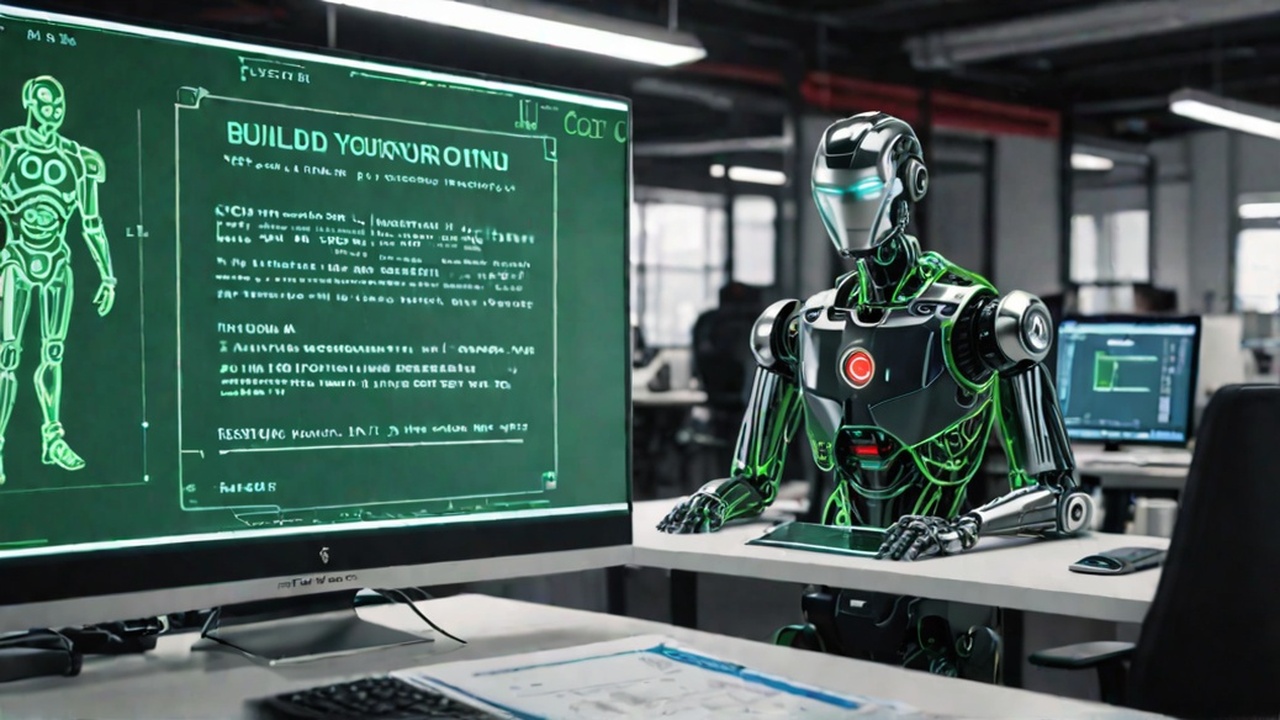Flashback to last week—I barely managed to fix my Wi-Fi using a YouTube tutorial, yet here I am, thinking about AI-driven businesses like it's as simple as brewing coffee. But everywhere I turn, AI is popping up—helping doctors diagnose patients, recommending Netflix shows I didn't know I needed, even arguing with my car over which playlist to start. Turns out this is the future we imagined? It's staring us in the face, daring us to join in. But what if you're like me—not born with a laptop in your crib? The good news is that you don't need to be a tech prodigy or a venture capitalist to gain a share in the AI industry.
AI Isn't Sci-Fi Anymore: It's in Your Pocket (And Probably Eyeballing Your To-Do List)
So I had the weirdest experience last week. I was chatting with what I thought was a customer service rep about my delayed package. I got sarcastic—you know, the typical "Oh suuure, it'll arrive 'soon' like the last three times you promised"—and the bot actually responded with "I detect some frustration there. Let me actually check with the warehouse instead of giving you standard updates."
Wait. What?
A machine understood my sarcasm? That's both impressive and slightly terrifying. But that's the thing—AI isn't hanging out in sci-fi movies anymore. AI is literally in our pockets, our homes, and yes, it is probably side-eyeing that to-do list you've been ignoring.
The Invisible AI Revolution
"AI is blowing up and it's not just some sci-fi fantasy anymore. It's integrated into our daily lives in ways we never imagined." This isn't just some techy hype—it's our reality now.
Think about your day so far. Have you:
Have you browsed through personalized social media feeds?
Did you watch something that Netflix recommended based on your interests?
Have you utilized navigation to avoid traffic?
That's all AI, baby. Your daily experience is shaped by the decisions AI silently makes in the background.
Beyond The Obvious
But AI's reach goes way deeper than our casual tech interactions. Healthcare algorithms are diagnosing diseases from medical images with accuracy that rivals specialists. Financial institutions employ AI to identify fraudulent activities before you become aware of a compromised card. Automotive companies are moving beyond driver assistance to fully autonomous vehicles.
The "future" isn't coming—it's already unpacked its bags and made itself comfortable on your couch.
The Human Connection
What excites us the most? We're rapidly embracing AI as the norm. My grandma—who still prints her emails—now refuses to take her medication without her AI assistant reminding her. "Alexa never forgets," she told me, "unlike you and your mother." (Thanks for the vote of confidence, Grandma.)
This psychological shift from viewing AI as futuristic to accepting it as routine is perhaps the most profound change. We're no longer asking IF we should adopt these technologies, but HOW QUICKLY we can integrate them.
AI is powering your social media, recommending your next binge watch, even driving your car. It's like having a personal assistant that knows you better than you know yourself.
The revolution is already present, hidden within the most ordinary moments of your day. The question isn't whether you'll participate in the AI future.
You already are.

The (Not-So) Secret Doors: How Regular Folks Break Into the AI Game
Let me dispel the most common misconception: building an AI business doesn't require you to be a coding expert or have millions in your bank account. That's just gatekeeping nonsense I hear all the time.
My Embarrassing First AI Project
Want to know a secret? My first "AI project" was basically digital LEGO building. I pieced together a customer service chatbot using drag-and-drop tools while sitting in my pajamas. It was clunky. It sometimes gave weird answers. But you know what? It worked.
And that's the thing most people don't realize about this field.
You don't need to be a coding ninja to build a successful AI business. There are plenty of no code and low code platforms available.
The Everyday Person's AI Toolkit
No-code platforms: Tools like Bubble, Voiceflow, and Zapier let you build AI-powered apps without writing a single line of code
Low-code solutions: Slightly more technical but still accessible to beginners
Online communities: Reddit, Discord servers, and forums full of people helping each other
Free tutorials: YouTube has thousands of step-by-step guides
The playing field has never been more level. I regularly see grandparents and teenagers alike building AI tools that actually solve real problems.
Bootstrapping Is Your Secret Weapon
Remember when everyone thought you needed venture capital millions to start anything worthwhile? Yeah, that's not true either.
Passion and hustle can take you a long way in the early stages.
Some of the most interesting AI startups I've seen began with little more than:
A laptop
Free time on evenings and weekends
A problem they were obsessed with solving
Starting small is often smarter than starting big. You can pivot quickly, learn from mistakes, and build something people actually want—not just what investors think will make money.
The Coffee Incident That Changed Everything
I'll never forget the week I ran out of both coffee and money, which was truly a difficult time. I couldn't afford my usual $5 coffee shop visits while working on AI projects.
So I built a simple AI tool that tracked coffee prices across my city and sent alerts when deals popped up. Built it in a weekend. Cost me nothing but time.
Isn't that tenacious "CoffeeBuddy" tool? It became my first MVP that actually made money. Sometimes constraints force creativity in ways abundance never could.
What tiny problem could you solve today with the AI tools already at your fingertips?

Find Your Weird—and Thrive: Niche Hunting in the Age of AI
I've always believed that the best ideas aren't the obvious ones—they're the weird ones that make people tilt their heads and say, "Wait, what?"
Think about it: AI for personalized pet playlists? Could we utilize humor in real estate matchmaking to connect buyers with their ideal homes? These aren't just quirky concepts—they're potentially million-dollar ideas hiding in plain sight.
The Power of Finding Your Niche
Here's what I've learned after years in this space: the riches truly are in the niches. When everyone rushes toward generic AI solutions, the real opportunity lies in specialization.
Your niche lies at the intersection of three key areas.
Your genuine passion (what makes you lose track of time)
Your unique knowledge (what you know better than most)
AI's transformative power
It's not just about technology; it's about what ignites your passion. Maybe you're obsessed with sustainable farming or vintage fashion or indie music discovery. Whatever it is, that's your edge.
"Your niche is where your passion, knowledge, and the power of AI intersect. This laser focus will be your superpower."
You Don't Need to Be First—You Need to Be Different
I see too many entrepreneurs paralyzed by the feeling that "everything's been done." But here's the truth: being first is overrated. Being better is what matters.
Out-imagining and outworking your competition will take you further than simply racing to market. AI makes hyper-personalization possible at scales we've never seen before—meaning there's room for countless solutions to similar problems.
Remember When Online Dating Was a Joke?
Let me take you back to 1995. Tell someone you met your partner online, and you'd get raised eyebrows and awkward silences. Fast forward to today. It's a multi-billion-dollar industry that's transformed how humans connect.
The same potential exists for niche AI solutions that might seem quirky today but will be mainstream tomorrow.
Finding Your Weird: Some Questions to Ask Yourself
Ask yourself:
Which problem am I truly enthusiastic about addressing with AI?
Which industry am I well-versed in?
What unique perspective do I bring that others don't?
When you find that weird intersection—that space where your obsessions meet your expertise—that's where the magic happens. That's where you'll find the resilience to persevere through the inevitable challenges.
Ultimately, passion drives a project, not just knowledge. In the rapidly evolving field of AI, your passion could prove to be your most valuable asset.

Don't Engineer Everything: Assemble, Partner, & Leap Ahead (Even If You Still Forget Your Password)
I've got news for you—you don't need to be the next Einstein of coding to ride the AI wave. Seriously.
Think about it. Do you understand how your car's engine works at a molecular level? Probably not, but you still drive it, right?
Build Like a Pro, Not a Mad Scientist
Here's the secret: you don't need to understand neural networks to use AI. The most successful entrepreneurs think like builders, not mad scientists locked in basements writing algorithms.
I remember staring at AI documentation feeling completely lost. My coding skills were... let's just say "developing." But I discovered something amazing:
There are ready-to-use AI tools that handle the complex stuff
Most successful AI businesses focus on solving problems, not building tech
The best entrepreneurs know when to build and when to borrow
Your Non-Technical Playbook
We have options, friends! Here are three paths forward if you're not a tech wizard:
Hire talent - Find those brilliant developers who eat, sleep, and breathe AI
Form strategic partnerships - Team up with established AI companies who already have the tech
Use plug-and-play platforms/APIs - Leverage pre-built solutions designed for easy integration
"You can leverage pre-built AI tools and platforms. These solutions are designed to be user-friendly and can be integrated into your existing systems with minimal effort."
Learn From the Giants
Did you know many tech giants didn't build everything themselves? Many big names began by leaning on available tech and expert partners, not building it all solo.
Instagram didn't create its own servers or photo filters from scratch. They assembled existing components and focused on what made them unique—the user experience.
Uber didn't invent GPS or payment processing. They combined existing technologies in a new way.
The IKEA Approach to AI
Using pre-built AI platforms is like assembling IKEA furniture. You get all the parts, clear(ish) instructions, and end up with something functional—just watch out for those missing screws!
We're building in an era where assembling is often smarter than engineering. Focus on customization and solving real problems. That's where the magic happens.
So stop worrying about becoming an AI genius. Start thinking about how to be a brilliant assembler instead. The future is waiting for you to build it—even if you still forget your password occasionally. I know I do!



